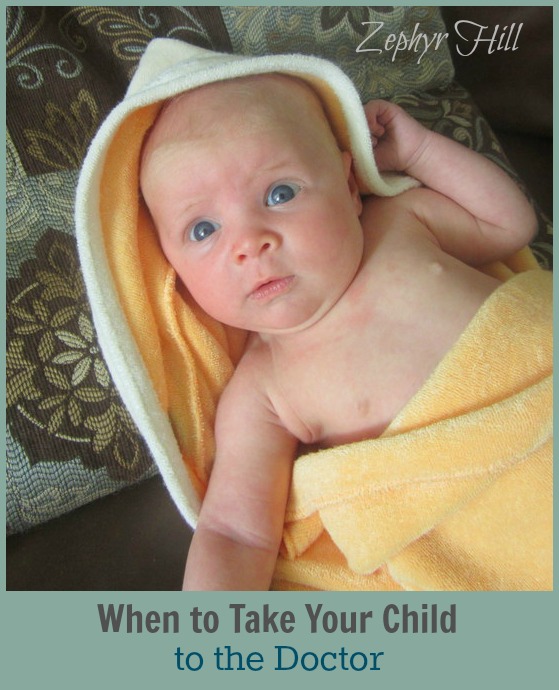You are concerned about symptoms your baby or child is having. Should you go to the doctor, or stay home and wait it out? The answer depends on symptoms, age and duration. This post is meant to be a collaborative effort among parents and doctors (sites I often reference are Dr. Sears and Dr. Greene). I’ll include my tips here and you are all welcome to make suggestions in the comments below because we all have experience and knowledge to share when it comes to red flags and warning signs.
It’s good to avoid unnecessary visits: you get exposed to germs (read this interesting case study!), you have another bill to pay, and it can also be very stressful for the child. Running to the doctor for every symptom or question shouldn’t be a knee jerk decision, but nor should you downplay your concerns. One thing that’s worked well for our family is to call the nurse first. He or she can listen to what the symptoms are and then help you decide if it warrants a visit. Quite often, the clinic can tell you what to be on the lookout for.
I’ve often been told to go with my intuition, but that’s just not always an accurate gauge for me. I’ll be honest and admit that 90% of the time I was in a panic about something, it turned out everything was ok. And then I felt bad about subjecting my child to being poked and prodded and exposed to germs for nothing. That being said, if something is bothering you to the point that you have no peace, then sometimes going to the doctor is the only thing you can do for reassurance. You just have to take the good with the bad.
And now, here’s the list of things you’d probably want a doctor to look at:
GENERAL
- Fever of 100 or higher in infants 3 months or younger
- Fever of 102 or higher for more than 24 hours
- Fever that doesn’t respond to medication
- Any prolonged fever (several days or more)
- Lethargy or fatigue that is worrisome (your baby or child doesn’t want to speak or look at you, seems limp, eyes are hollow or vacant)
- After a vaccination: swelling, redness, pain or fever that persist past 48 hours; allergic reactions such as hives, dizziness, fainting, difficulty breathing, etc.
- Chronic headaches or sudden/severe headache
RESPIRATORY
- Breathing issues of any kind: rapid, slow, labored, noisy
- Chronic cough
- Coughing fits or spasms, or those that cause gagging and/or vomiting
- Ear pain that doesn’t resolve within 24 to 48 hours
- Cold symptoms that worsen after several days
- Sore throat that is accompanied by high fever, rash, swollen neck glands, headache and/or stomachache
GASTROINTESTINAL
- Refusing food/bottle/breastmilk
- Vomiting or diarrhea that last for more than 24 hours in a very young child
- Vomiting or diarrhea that contains blood
- Vomiting right after taking prescribed medication
- Less than 6 wet diapers in a day
- Unexplained stomach pain that doesn’t resolve within a couple of hours, or is a chronic thing (your child complains about it from day to day)
MUSCULAR/SKELETAL/SKIN
- Rashes that spread rapidly, are painful, cause significant itching, or occur after contact with food/medication/plants/animals, etc.
- A rash that is completely flat and doesn’t blanche (turn white) when you press on it. The tiny dots are red or purplish blue and can indicate very serious infection. (NOTE: If you see these tiny dots on a child’s face after a coughing fit or vomiting, it’s not a cause for concern)
- Injuries of any kind that cause greater-than-normal pain, stress or loss of mobility
- Burns that are not minor/superficial
- Muscle or joint pain that persists for more than a week and/or is more pronounced after waking up.
NERVOUS/PSYCHOLOGICAL
- Emotional distress that keeps a child from functioning normally, overwhelms him or is interfering with developmental milestones and/or success in school.
- Hurting oneself or threatening to harm others.
- Seizures, twitches, involuntary movements or sounds, repetitive movements/behaviors
- Intense fearfulness or anxiety
- Regressive behavior
EXCRETORY/REPRODUCTVE
- Difficulty passing urine or stool
- Noticeable changes in output (more frequent, less frequent, strange consistency, odor, etc.)
- Blood in urine or stool
- Pain, redness or irritation in or around private parts
- Cycle irregularities (excessive bleeding, excessive length, severe pain, cessation of cycling)
This is a blog post we can all help keep updated, so it will be as useful as possible!


You bring up a good point about possible exposing your child to germs when you take them to the doctor. I’m super paranoid about this. The hospital on base has a separate room for well baby visits, which I like, because we don’t have to sit in the same room as a child who is sick. But , you do have to walk through the hall where all the sick adults and children are. Thanks for the post! Very helpful!!
Anel, I also like it when they try to keep the clinic separate from the sick areas! Same with maternity wards; ideally, healthy women giving birth should not be anywhere near sick people in a hospital. ~Anne
These are really good guidelines to follow. When it comes down to it, I tend to just go with my gut on that.
Good advice! I often checked in with my mom and she would recite those lists to me…even 30 years ago! It’s nice to know that mother logic continues through the decades! 🙂
I still call my mother, too. 😉 ~Anne
This is so helpful! I’ve always been thankful for the nurses at my pediatrician’s office; they really help me make the judgment call about whether or not to bring my son in.
I’ve never been lucky to have a helpful nurse at a ped office. I’ve always been told to come in if I think necessary. I decided against a ped when we moved and went with a family practice doc which I have found more helpful, as is the nurse when I’ve called. We’ve had a lot of experience with many things you mentioned. I tend to go with my gut as well since my husband is not a worrier and says the Dr is never necessary and there have only been a couple occasions where he was right.
Fevers are tough. I’ve seen people rush their kids in to the er with 102. My toddler got up to 105 a few days ago. And I have another child that tends to go that high with simple viruses. It helps to know your child’s body responses and patterns, definitely. And I also like to reference both those Dr’s you mentioned. Treat the child not the fever. Behavior is key for most sicknesses I’ve found.
Fevers ARE tough. There are some serious conditions where they don’t run a high fever, and it’s also true they can run a high fever and not be that sick, so fever alone still throws me sometimes. Every once in a while I get a nurse that is very noncommital and just wants to set us up with an appointment. In that case, I’ll push a little harder and explain that we have 7 children and it’s not easy for us just to pop in when I have questions. Worst case scenario, I will just say “thanks” and call back later to speak with someone more helpful!
You’re so right about behavior, Kristina. That is a really good cue for determining how bad off they are. A really sick child is going to act really sick, whereas with most childhood maladies they will continue to play and be fairly normal. Thank you so much for stopping by to share your advice and experience! ~Anne
More than once, I would wait and wait to go to the doctor. Then I would finally decide to go–only to have the kid get better after seeing the doctor! I usually call my mom and ask her what she thinks 🙂
Yeah, that happens to us, too. Time is a good tincture! ~Anne
Joint pain in my girls knees is kind of an on and off thing here…..I’ve considered taking her in to see the dr. but it’s something that kind of runs in the family.
My daughter has had pain like that off and on, and in her hands, too. We finally asked the doctor about it, and she felt it was simple growing pains, not juvenile arthritis. Is your daughter’s worse in the morning, Laurie? ~Anne
It’s usually in the middle of the night. She wakes up crying. The kind of crying that a mother knows is pain. It doesn’t last too long and if I ask her in the morning about it, she touches her knees. Definitely growing pains.
My boy had it on and off right up until he was about 12. He’s 17 now and 6’2.
I’m glad you mentioned that it happened even up to age 12. My daughter’s started several years ago and she’s 11 now, so I guess time will resolve it. ~Anne
🙂